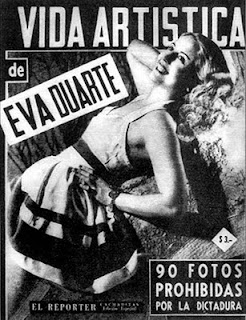 We had a great blocking rehearsal last night. We've now staged a little more than half of Act I. And I feel a lot more confident that my approach is the right one. This Evita will not look or feel like any other Evita you've seen, but I honestly believe this is the best way I can think of to tell this story clearly and effectively. While the original Broadway production told the audience what to think about Eva, our production will present two totally conflicting views of who (and what) she was, and leave it to the audience to pick sides. Doesn't that sound like more fun?
We had a great blocking rehearsal last night. We've now staged a little more than half of Act I. And I feel a lot more confident that my approach is the right one. This Evita will not look or feel like any other Evita you've seen, but I honestly believe this is the best way I can think of to tell this story clearly and effectively. While the original Broadway production told the audience what to think about Eva, our production will present two totally conflicting views of who (and what) she was, and leave it to the audience to pick sides. Doesn't that sound like more fun?Like a lot of New Line shows, this is going to be very conceptual and very minimalist, but I love that, precisely because it leaves so much room for the actor.
The more I work in the theatre, the more I understand one big thing about myself as a theatre artist: I love actors. I don't like sets much. I recognize costumes as a necessary hassle. And I really hate props. (Ask the New Liners, I'll cut any prop I possibly can.)
But I love actors. I think the best theatre experiences I've had as an audience member have been those shows when all the other elements get out of the way of the actors and let them do what they're best at -- revealing the truth of being human. Most recently, it was the Rep's Saint Joan. The set was big and it was beautiful, but it was really only backdrop, almost never changing. It was a very artful bare stage. And the cast of fourteen conjured up amazing characters and worlds and emotions, with very little besides their talent and their joy. Going back, I also remember extremely minimalist -- and totally amazing -- productions of Man of La Mancha at the Westport Playhouse and Ambition Facing West at the Rep.
 My favorite New Line examples would be Man of La Mancha and Cabaret (both designed by the mutli-talented Todd Schaefer), Bat Boy, and A New Brain, all four done with essentially nothing but a bare stage, though very carefully and artfully wrought. I can guarantee you our audiences weren't wondering why there wasn 't more set for those shows; they were too involved in the characters on those stages. There's a reason Shakespeare wrote the way he did -- his was a theatre of words and ideas, not sets and special effects. By necessity, he had to engage the audience's imagination to collaborate on the illusion. And that's why actors love Shakespeare -- everything's in the words. It's all on them.
My favorite New Line examples would be Man of La Mancha and Cabaret (both designed by the mutli-talented Todd Schaefer), Bat Boy, and A New Brain, all four done with essentially nothing but a bare stage, though very carefully and artfully wrought. I can guarantee you our audiences weren't wondering why there wasn 't more set for those shows; they were too involved in the characters on those stages. There's a reason Shakespeare wrote the way he did -- his was a theatre of words and ideas, not sets and special effects. By necessity, he had to engage the audience's imagination to collaborate on the illusion. And that's why actors love Shakespeare -- everything's in the words. It's all on them.New Line's Evita will be almost that minimal, though with a touch of the Group Theatre and a big helping of Brecht. This will be a show about acting, about character, about story. We don't need spectacle to tell this story and we don't need a massive scale. This is a deceptively simple love story between Eva Peron and the working people -- the descamisados -- of Argentina. All we need is really talented storytellers, and we've got a cast of fifteen who are just that.
We've only had two blocking rehearsals but it's already so obvious they're all absolutely willing to try whatever I ask. They're all going to be excellent collaborators on this adventure of ours. I am most fortunate to be blessed with a cast like this on almost every show over the last few years. Maybe it's because I project more confidence than I used to, or maybe I've gotten better at communicating my ideas, or maybe my ideas are just better than they used to be. But whatever the reason, I know how lucky I am to get actors this talented, this fearless, this easy to direct, and this free of ego, on a regular basis, particularly for shows as challenging as Evita.
Maybe it's just about the atmosphere we try to create at New Line that constantly reminds everyone that we work in the theatre, not in "show business." We're not here to make a product; we're making art.
Long Live the Musical!
Scott







0 comments:
Post a Comment